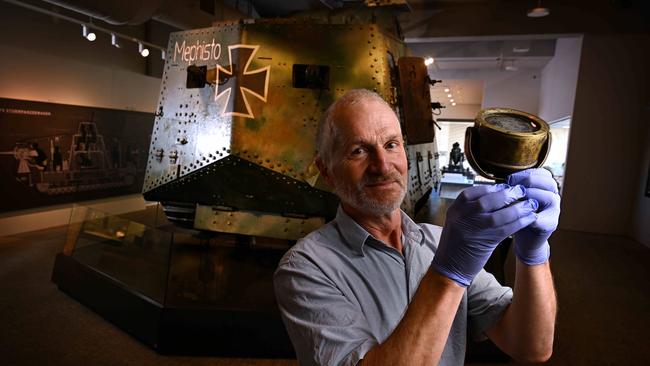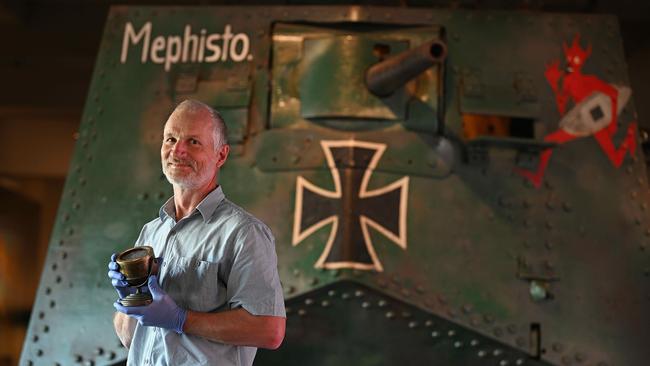WWI compass finds its way home to Mephisto
A WWI German military compass, handed down from an Australian Digger to his grandson, is back where it belongs in the world’s rarest tank.

After occupying pride of place at the Queensland Museum for 104 years, who knew there was more to the celebrated story of Mephisto – the 35-tonne “souvenir” light-fingered Diggers brought home from World War I.
The armoured behemoth is the only German tank to have emerged intact from the carnage of the Western Front and the Australian troops who seized it made sure to take personal mementos, stripping out just about anything that wasn’t welded in place.
That evidently included the tank’s state-of-the-art compass, which Gallipoli veteran Horace Lynch handed down to his grandson, Tom Lamin. It was the start of a long and winding journey that ended this week when Mr Lamin, 65, officially signed over the instrument to the museum in Brisbane.
“It’s a good thing to do,” said the retired mechanical engineer from Deans Marsh, Victoria. “This was important to my grandfather and important to me because he gave me the compass, but I don’t think it will mean that much to the next generation of our family.
“They would probably say, ‘what the hell is this?’, sell it to an antique dealer and we all lose,” Mr Lamin told The Weekend Australian.

The story starts at Villers-Brettonneux in the northern spring of 1918, scene of a famous Australian victory. One of only 21 tanks built by the Germans late in the war, Mephisto had been deployed in a last roll of the dice to break the Allied armies in France and Belgium before the newly engaged Americans tipped the balance against Germany.
The lumbering A7V tank bogged in a shell-hole and was abandoned by its crew, a metaphor for the flagging German offensive as the critical attack at Villers-Brettonneux was beaten off by the Australians. Later, they “liberated” Mephisto as a war trophy.
By then Lynch was a newly minted lieutenant, having survived his baptism of fire in the Dardanelles campaign and two years of bloodshed in the trenches. When he gave the compass to his then 10-year-old grandson, he said it had come from a German tank.
“Until a few years ago it just sat in the garage, gathering dust,” Mr Lamin said. “Then I started to think about it: Where could it have come from?”
He did some research and came across Mephisto, renowned as the world’s rarest military tank. Last August, driving to Cairns for a holiday, Mr Lamin stopped in at the Queensland Museum and left a message about the compass. He was pleasantly surprised when information officer Damien Fegan called back. Yes, the museum was interested. When could staff see it?
But first, there was the question of provenance. Mr Fegan contacted the German Panzermuseum in Munster and scoured online records to establish that the instrument was German-made, by either the WWI-era Bamberg or Plath works, and had magnetic dampeners for it to work in the steel cage of a tank.
Mephisto was in the first batch of A7Vs to emerge from the Krupp factory, and the specifications showed it originally did not mount a direction finder. But it was likely one was fitted when the tank was later modified or overhauled, Mr Fegan found.
Lynch, however, had gone down with the flu in early 1918 and was hospitalised in England during the fighting at Villers-Brettonneux, never to return to the frontline. How could he have got his hands on the compass?
The answer lay in his service records. When recovered, Lynch had been posted to Tilbury Docks in London to assist with repatriation of Australian troops home. And Mephisto had been parked outside his office, waiting to be hoisted aboard the ship that would take it to Brisbane in 1919. Given he had been an apprentice engineer before joining up, the tank would have certainly caught his eye.
Case closed.
“We are 99.99 per cent confident it’s a super hi-tech military compass for the period that had to come from a tank, a German submarine or a Zeppelin,” Mr Fegan said. “Mephisto was the only tank it could have come from and if it was from something else, and say Horace had traded for it when he was in England, why did he tell Tom he got it off a tank?”
Mr Lamin said: “It’s a nice ending to a very long story.”




To join the conversation, please log in. Don't have an account? Register
Join the conversation, you are commenting as Logout